Laser hair removal is an effective and popular method for long-term hair reduction, but what happens if you have tattoos? Many people considering laser hair removal in Dubai are concerned about whether the treatment will damage their tattoos or affect their skin in any way. This article will explore the relationship between laser hair removal and tattoos, addressing common concerns and providing insights to help you make an informed decision.
Understanding Laser Hair Removal:
Laser hair removal (إزالة الشعر بالليزر) involves using concentrated light beams to target and damage hair follicles. This damage prevents or reduces hair growth over time. The laser works by emitting light at a specific wavelength that is absorbed by the pigment in hair, making it more effective on darker hair types.
However, the question arises: what happens when this laser is directed at tattooed skin? Can it affect the ink? The answer depends on a few important factors that we will discuss below.
Can Laser Hair Removal Damage My Tattoo?
Laser hair removal is generally safe when performed by trained professionals, but tattoos can present a unique challenge. Since laser hair removal targets pigment in the skin, it is important to understand how the laser interacts with the tattoo ink.
Impact on Tattoo Ink:
Tattoo ink consists of various pigments, which can absorb the laser's light, leading to potential changes in the tattoo’s appearance. In some cases, the laser might cause the tattoo to fade, blur, or distort the design. The effect is more noticeable if the tattoo is located in an area being treated by the laser.
The light energy from the laser can cause the ink to break down, leading to a change in color or intensity. While the tattoo won't disappear completely, the laser could cause it to lose some vibrancy or detail, especially in the areas where hair removal treatment is concentrated.
Sensitivity and Skin Health:
Tattooed skin is often more sensitive than untattooed skin. The process of tattooing involves puncturing the skin with ink, which creates small trauma to the surface. If laser hair removal is performed over tattooed skin, the skin might be more sensitive to the treatment, leading to possible irritation or discomfort.
In some cases, excessive exposure to the laser can cause scarring or hyperpigmentation (dark spots) on the tattooed skin, although this is rare. It is important to ensure that the skin is properly healed before undergoing laser hair removal treatments.
How to Safeguard Your Tattoos During Laser Hair Removal?
If you're considering laser hair removal but are worried about your tattoos, there are a few steps you can take to protect them:
Consult with a Professional:
Before undergoing laser hair removal, it’s crucial to consult with a trained technician or specialist. A professional can assess your tattoo, its location, and whether it's safe to treat the area without affecting the design.
Avoid Treating Tattooed Areas Directly:
In many cases, it may be best to avoid direct laser exposure to tattooed areas. A professional can work around the tattoo, focusing on the surrounding skin instead. This can help you achieve hair removal in nearby areas without risking damage to the tattoo itself.
Wait for Full Healing:
If your tattoo is new, it is important to wait until the skin has fully healed before considering laser hair removal. Healing times can vary depending on the size and location of the tattoo, but it is generally recommended to wait at least 6 to 8 weeks before treating tattooed skin.
Test Patch:
If you are unsure how your skin will react to the laser, ask for a test patch. This involves performing a small test treatment on a small area of tattooed skin to see how it reacts. If there’s any adverse effect, such as fading or irritation, the technician can adjust the treatment or avoid that area altogether.
Use Sunscreen:
After your laser hair removal treatment, it’s important to protect the treated area from the sun. This is especially true for tattooed skin, as the UV rays can cause tattoos to fade over time. Applying sunscreen to the treated area will help preserve the vibrancy of your tattoo and protect the skin.
Frequently Asked Questions (FAQs):
Will laser hair removal cause my tattoo to fade completely?
Laser hair removal typically causes a slight fading of the tattoo, but it is unlikely to remove the tattoo completely. The extent of fading depends on the ink color, the laser used, and the treatment area.
Can I get laser hair removal on tattooed skin?
Yes, it is possible to get laser hair removal on tattooed skin, but care must be taken to avoid the tattoo itself. Many professionals will work around the tattooed area to prevent any damage to the design.
Does laser hair removal hurt more on tattooed skin?
Tattooed skin can be more sensitive to the laser, so some individuals may experience more discomfort during treatment. However, the pain level is usually manageable, and cooling systems on modern lasers help alleviate some of the discomfort.
How many sessions will I need for laser hair removal over tattooed skin?
The number of sessions required will depend on the area being treated and the density of hair. Typically, it takes around 6 to 8 sessions to see significant results. A professional can provide an estimate based on your individual needs.
Conclusion:
Laser hair removal (إزالة الشعر بالليزر) in Dubai is an effective and popular method for achieving smooth, hair-free skin. However, if you have tattoos, it’s important to understand the potential impact of laser treatment on your body art. While laser hair removal may cause some fading or discoloration of tattoos, it is generally safe as long as proper precautions are taken. By consulting with a professional, waiting for full healing, and following aftercare instructions, you can enjoy the benefits of laser hair removal without sacrificing the integrity of your tattoos.









